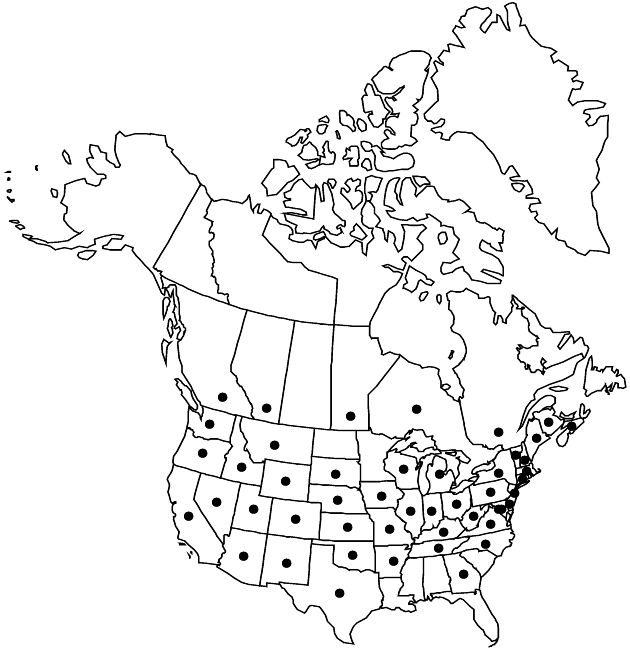Difference between revisions of "Tragopogon porrifolius"
Sp. Pl. 2: 789. 1753.
FNA>Volume Importer |
imported>Volume Importer |
||
| (5 intermediate revisions by 2 users not shown) | |||
| Line 8: | Line 8: | ||
}} | }} | ||
|common_names=Salsify;vegetable oyster;salsifis cultivé | |common_names=Salsify;vegetable oyster;salsifis cultivé | ||
| + | |special_status={{Treatment/ID/Special_status | ||
| + | |code=I | ||
| + | |label=Introduced | ||
| + | }} | ||
|basionyms= | |basionyms= | ||
|synonyms= | |synonyms= | ||
| Line 24: | Line 28: | ||
|elevation=200–2000 m | |elevation=200–2000 m | ||
|distribution=Alta.;B.C.;Man.;N.B.;N.S.;Ont.;Que.;Ariz.;Ark.;Calif.;Colo.;Conn.;Del.;D.C.;Ga.;Idaho;Ill.;Ind.;Iowa;Kans.;Ky.;Maine;Md.;Mass.;Mich.;Mo.;Mont.;Nebr.;Nev.;N.H.;N.J.;N.Mex.;N.Y.;N.C.;Ohio;Okla.;Oreg.;Pa.;S.Dak.;Tenn.;Tex.;Utah;Vt.;Va.;Wash.;W.Va.;Wis.;Wyo.;Europe;n Africa;introduced;Pacific Islands (Hawaii);Australia. | |distribution=Alta.;B.C.;Man.;N.B.;N.S.;Ont.;Que.;Ariz.;Ark.;Calif.;Colo.;Conn.;Del.;D.C.;Ga.;Idaho;Ill.;Ind.;Iowa;Kans.;Ky.;Maine;Md.;Mass.;Mich.;Mo.;Mont.;Nebr.;Nev.;N.H.;N.J.;N.Mex.;N.Y.;N.C.;Ohio;Okla.;Oreg.;Pa.;S.Dak.;Tenn.;Tex.;Utah;Vt.;Va.;Wash.;W.Va.;Wis.;Wyo.;Europe;n Africa;introduced;Pacific Islands (Hawaii);Australia. | ||
| + | |introduced=true | ||
|discussion=<p><i>Tragopogon porrifolius</i> is occasionally cultivated in Europe and naturalized across much of North America. It grows typically in sites drier than those of <i>T. pratensis</i> and in sites shadier and/or moister than those of <i>T. dubius</i>. As currently circumscribed, it may not be monophyletic, and nomenclatural changes for the populations here may be required. In North America, <i>T. porrifolius</i> hybridizes with both <i>T. dubius</i> and <i>T. pratensis</i> (= T. ×neohybridus Farwell, described from North America, and T. ×mirabilis Rouy, described from Europe).</p> | |discussion=<p><i>Tragopogon porrifolius</i> is occasionally cultivated in Europe and naturalized across much of North America. It grows typically in sites drier than those of <i>T. pratensis</i> and in sites shadier and/or moister than those of <i>T. dubius</i>. As currently circumscribed, it may not be monophyletic, and nomenclatural changes for the populations here may be required. In North America, <i>T. porrifolius</i> hybridizes with both <i>T. dubius</i> and <i>T. pratensis</i> (= T. ×neohybridus Farwell, described from North America, and T. ×mirabilis Rouy, described from Europe).</p> | ||
|tables= | |tables= | ||
| Line 33: | Line 38: | ||
-->{{#Taxon: | -->{{#Taxon: | ||
name=Tragopogon porrifolius | name=Tragopogon porrifolius | ||
| − | |||
|authority=Linnaeus | |authority=Linnaeus | ||
|rank=species | |rank=species | ||
| Line 48: | Line 52: | ||
|publication title=Sp. Pl. | |publication title=Sp. Pl. | ||
|publication year=1753 | |publication year=1753 | ||
| − | |special status= | + | |special status=Introduced |
| − | |source xml=https:// | + | |source xml=https://bitbucket.org/aafc-mbb/fna-data-curation/src/2e0870ddd59836b60bcf96646a41e87ea5a5943a/coarse_grained_fna_xml/V19-20-21/V19_451.xml |
|tribe=Asteraceae tribe Cichorieae | |tribe=Asteraceae tribe Cichorieae | ||
|genus=Tragopogon | |genus=Tragopogon | ||
Latest revision as of 19:51, 5 November 2020
Plants 40–100(–150) cm. Leaves: apices straight (not recurved or coiled), faces usually glabrous. Peduncles distally inflated. Involucres conic in bud. Outer florets usually shorter than or equaling phyllaries; corollas purple. 2n = 12.
Phenology: Flowering Apr–Aug.
Habitat: Disturbed sites
Elevation: 200–2000 m
Distribution

Introduced; Alta., B.C., Man., N.B., N.S., Ont., Que., Ariz., Ark., Calif., Colo., Conn., Del., D.C., Ga., Idaho, Ill., Ind., Iowa, Kans., Ky., Maine, Md., Mass., Mich., Mo., Mont., Nebr., Nev., N.H., N.J., N.Mex., N.Y., N.C., Ohio, Okla., Oreg., Pa., S.Dak., Tenn., Tex., Utah, Vt., Va., Wash., W.Va., Wis., Wyo., Europe, n Africa, introduced, Pacific Islands (Hawaii), Australia.
Discussion
Tragopogon porrifolius is occasionally cultivated in Europe and naturalized across much of North America. It grows typically in sites drier than those of T. pratensis and in sites shadier and/or moister than those of T. dubius. As currently circumscribed, it may not be monophyletic, and nomenclatural changes for the populations here may be required. In North America, T. porrifolius hybridizes with both T. dubius and T. pratensis (= T. ×neohybridus Farwell, described from North America, and T. ×mirabilis Rouy, described from Europe).
Selected References
None.